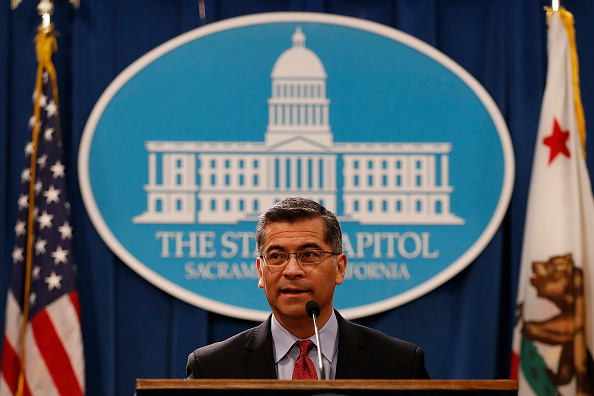
Xavier Becerra at the California State Capitol when he was the state’s Attorney General
In a 50-49 vote last week, the Senate narrowly confirmed California Attorney General Xavier Becerra as Department of Health and Human Services (HHS) Secretary.
President Biden surprised the nation with his choice of a health lawyer instead of one of his top docs like Vivek Murthy.
Yet, despite his lack of medical background, Becerra has years of experience drafting and defending laws to protect the public’s health.
“We found it impressive that he was unafraid to go against big and powerful industry players, whether drug companies or hospital chains,” Health Access California Executive Director Anthony Wright said in a phone interview. “We are hopeful he brings a similar fearlessness to dealing with the health care industry at a federal level.”
Another policy expert reminded people that Becerra wasn’t afraid to lob legal challenges to the previous administration.
“In Xavier Becerra, President-Elect Biden has selected a person who has been perhaps the biggest thorn in President Trump’s side on the ACA, reproductive health, and immigrant rights,” tweeted Larry Levin, Kaiser Family Foundation’s Executive Vice President for Health Policy.
What can we learn from his background about how he might lead the country’s top health agency?
The ACA Has a Strong Ally
While Senate Republicans attempted to argue he lacked the experience to head HHS, Becerra does bring 24 years of Beltway experience, having represented his Los Angeles community for 12 terms in the U.S. House of Representatives before succeeding Vice President Kamala Harris to become California’s 33rd Attorney General in 2017.
He is the first Latino to hold that office, and while in Congress was the first Latino to serve on the Ways and Means Committee, where he was a senior member of the health subcommittee. He also held the powerful post as leader of the House Democratic Caucus.
Becerra spent much of his time in Congress as a staunch defender of the Affordable Care Act. Shortly before leaving the House, he voted against HR3, a budget amendment to repeal the ACA, and as Attorney General he defended it against Republicans all the way to the Supreme Court.
“Becerra is the ultimate defender of ACA,” Wright said, “who is in a small group that can claim authorship of ACA with full authority.”
In his three years as Attorney General, Becerra not only battled to protect the ACA, but led historic cases to right the wrongs of the opioid epidemic, hold companies accountable for overcharging state Medicaid, protect 340B discounts, and stop hospital mega-mergers such as Sutter Health.
This was enough to sway all Senate Democrats and Maine Republican Susan Collins to vote for confirmation.
Hospital Mergers Under the Microscope
While health system consolidation is all the rage, Becerra is likely to hold hospitals’ feet to the fire when it comes to antitrust issues.
“HHS’ new head is well aware of anticompetitive practices by healthcare companies and organizations, and I expect he will pursue ways for HHS to promote healthier markets and higher value for consumers,” Harvard Business School Professor Leemore Dafny said in an email.
This is hopeful news to UC Hastings Professor of Law Thomas Greaney, who has followed Becerra’s work.
“There are a number of ways in which HHS might foster competition and in some cases reduce the need to rely on antitrust for protecting market abuse,” Greaney said in an email. “I would be interested in whether HHS has any plans to try to curb the growing market power of health care systems that can exploit their position via ‘all or nothing contracts’ and other anticompetitive contract clauses with commercial carriers as alleged in the recent case Becerra brought against Sutter Healthcare as Attorney General of California.”
In California v. Sutter Health, Becerra charged a Bay Area hospital system with acquiring its competitors and using its monopoly power to radically drive up area prices. The state accused Sutter of forcing insurers to include all of Sutter’s medical facilities in their networks if they wanted to contract with Sutter at all.
According to a 2018 study from the Nicholas C. Petris Center at the University of California-Berkeley that Becerra’s team cited in the complaint, the alleged anticompetitive behavior drove regional costs between 20-30% higher than Southern California, even accounting for differences in cost of living.
In December 2020, Sutter Health settled with California for $575 million in one of the largest health care antitrust settlements in US history.
USC Professor of Healthcare Finance Glenn Melnick thinks this experience will be invaluable at HHS.
“Consolidation is accelerating, and as I tell my students, trends are national but markets are local so if provider groups or other healthcare systems can get control of big pieces of markets we’re in trouble as a nation,” he said in a phone interview.
Having worked with Becerra’s office, Melnick believes he has the understanding of market forces to curb this trend.
“The federal government gets impacted by market forces because under ACA, the federal government pays a chunk of private premiums on policies offered on the healthcare exchanges, which are driven up by higher health system prices so theoretically he has authority to call hearings and say ‘how do we control this price-hiking consolidation?’” Melnick said by phone.
‘Pay-for-Delay’ Deals in Peril
As AG, Becerra led California to ban “pay-for-delay” deals between branded and generic pharmaceutical companies, making it the first state in the nation to do so. He worked closely with advocacy group leaders such as Health Access California’s Anthony Wright to craft and pass this historic legislation.
“When these deals happen, there are two parties in the room that benefit at the expense of the third party, the public — the brand gets to avoid competition, the generic gets a payoff, but the loser in the deal is patients, the public and payers who are paying inflated prices for prescription drugs,” Wright said in a phone interview. “So we are glad we’re going from having an HHS secretary that is an ex-pharma executive to one who has experience holding pharma accountable.”
Pay-for-delay agreements are deals where brand-name drug companies provide generic drug manufacturers with some form of compensation in exchange for not bringing a generic competitor to market for some period of time.
AG Becerra was instrumental in pushing through AB 824, signed into law by Governor Newsom in October 2019.
This law increased antitrust scrutiny of patent settlement agreements between branded and generic pharmaceutical manufacturers, holding a microscope to both small-molecule drug development regulated under the Hatch-Waxman Act and biosimilar settlements brought under the Biologics Price Competition and Innovation Act (BPCIA).
Last July, Becerra defeated a Ninth Circuit challenge to the law by generic pharmaceutical industry group Association for Accessible Medicines (AAM), which the court rejected for lack of standing.
However, generic drugmakers are hoping to have greater influence on Becerra in his new role.
In an email, AAM SVP and General Counsel Jeff Francer said the association and its members look forward to working with Becerra “to secure patient access to safe, effective and affordable generic and biosimilar medicines.”
Francer continued: “The sustainability of the generic and biosimilars industry is at risk from anticompetitive practices and market access challenges, and we will work with Secretary-designate Becerra to advance policies that enhance the competitiveness of these medicines that bring outsized value to our nation by saving lives and containing costs during this public health crisis and beyond.”
Before pushing for AB 824’s regulatory fixes, Becerra settled a suit with three pharmaceutical companies (Teva, Endo, and Teikoku) that California had accused of participating in pay-for-delay agreements.
“I took on a number of these drugmakers by going behind the curtain on how they reached their pricing and we were able to prove there was collusion going on,” Becerra told senators in his February confirmation hearing.
While representatives from PhRMA declined to comment for this article when asked how they felt Becerra’s nomination would impact their industry, PhRMA president and CEO Steve Ubl congratulated him in an official statement released March 18, saying: “We look forward to continuing our collaboration with the department under his leadership and working together to help address our nation’s leading priorities: getting COVID-19 under control and improving health care affordability and access for all Americans.”
Protecting Health Equity
Becerra has the support of the American Hospital Association, whose President Richard J. Pollack recommended his confirmation. Becerra will, in many ways, be a natural ally to the AHA as HHS Secretary, as he has spent decades championing many of their core legislative issues, such as the Affordable Care Act and enforcement of 340B drug discounts.
Indeed, in a December letter to then-secretary Alex Azar, Becerra and his fellow Attorneys General pushed HHS to take action against drug companies they said were violating their statutory obligations under the 340B drug pricing program, which requires any manufacturer that wishes to be repaid under Medicaid or Medicare Part B to offer “drugs at or below the applicable ceiling price” to covered entities such as community health centers.
“Each day that drug manufacturers violate their statutory obligations,” the letter said, “vulnerable patients and their healthcare centers are deprived of the essential healthcare resources that Congress intended to provide.”
A Deep Bench Awaits Action
Becerra has a number of attorneys joining him in the Biden Administration’s health team.
Chiquita Brooks-LaSure, managing director of the health group at Manatt, led the Biden Administration’s transitional review of the Department of Health and Human Services and is now Biden’s nominee for head of Medicare and Medicaid Services. Lisa Barclay went from leading Biden’s review of the Food and Drug Administration while a partner at Boies Schiller & Flexner to joining Becerra’s team as Deputy General Counsel of HHS.
Beyond HHS, a number of other well-established health attorneys will guide the administration’s response to Covid and efforts to shore up our nation’s healthcare infrastructure.
Amy Chang will serve as a policy adviser to the Biden administration, having previously worked in the Obama administration as a special assistant in the office of the secretary at HHS.
Abbe Gluck will serve as special counsel, coming from Yale Law School.
Yale Law alum Rosa Po joins Gluck as Covid-19 response team deputy chief of staff, having advised domestic and economic agency review during the Biden transition. During the Obama administration, Po served as a policy adviser to the assistant secretary for planning and evaluation at HHS.
Andy Slavitt was appointed senior adviser to the Covid-19 response coordinator. He served as acting administrator for CMS under President Obama, overseeing Medicaid, Medicare, the Children’s Health Insurance Program, payment reform and the health insurance marketplace, most famously being credited with the turnaround of the troubled healthcare.gov website.
Tackling Once-in-a-Lifetime Challenges
What can we expect from his early days, according to his longtime colleague Anthony Wright?
“Obviously, Becerra’s first priority at the moment is the Covid-19 crisis,” Wright said in a phone interview. “He will have an important role to play in getting us out of this in terms of organizing the healthcare delivery system to be as responsive as possible to this moment to provide health and economic security to families struggling right now.” Further, Wright said Becerra will be of tremendous service as “a gifted communicator in Spanish who will play an important role in ensuring that health equity is an important part of the Covid recovery.”
Once we are through the worst of this pandemic, Wright anticipates Becerra’s next top priority will be “not only implementing but improving ACA.”
Wright said: “Becerra knows what we’ve won but is also acutely aware of the remaining gaps, and we trust he will take big steps toward a universal and more affordable and equitable system.”
Photo: Stephen Lam, Getty Images








